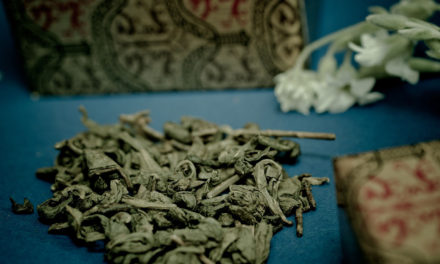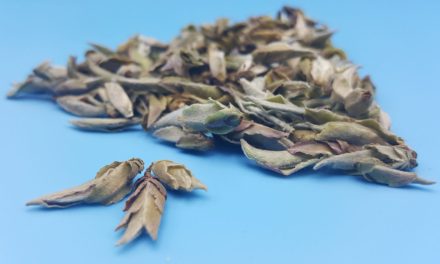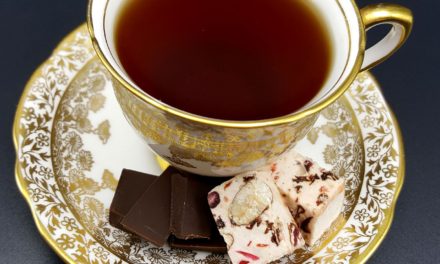Lemon Verbena Tea: The
Forgotten Wonder Leaves

by Evelyn Reid
Originally published on Where’s Your Head?
December 7, 2017
The first time I found fresh lemon verbena leaves at my local farmer’s market, I was accosted by no less than six complete strangers within ten minutes of buying the herb.
The brouhaha started within seconds of purchasing a bushel of the fragrant leaves the herb farmer had hidden behind his stand. ”Do you like tea?,” he asked me. ”I have something you’re going to love. I grew it myself,” he said, seducing me with lemon verbena’s permeating scent, its olfactory intensity amplified with every brush its leaves made against my skin. It smelled of something lemony. But different. Barely 20 steps later on my way to the liquor store to pick up my favorite bottle of Sangiovese, two older women approached me. One could only speak Arabic. The other was fluent in French, my second language.
”My friend says you smell like her childhood,” said the French speaker. ”The leaves you’re carrying grow in her native land.”
Her golden-aged friend lunged toward me with the energy of a toddler to smell the bushel cradled in the nook of my arm. She was beaming, as if the scent was adding years to her life.
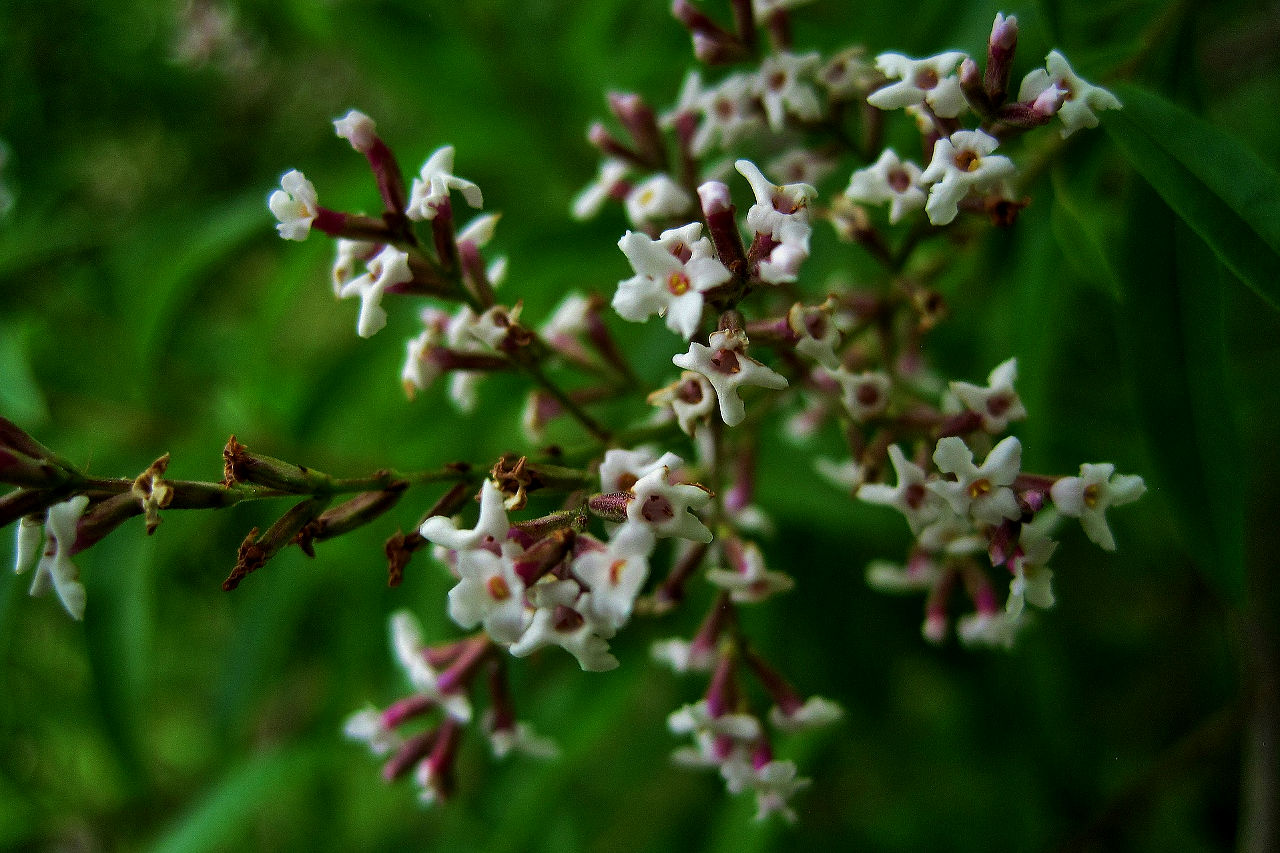
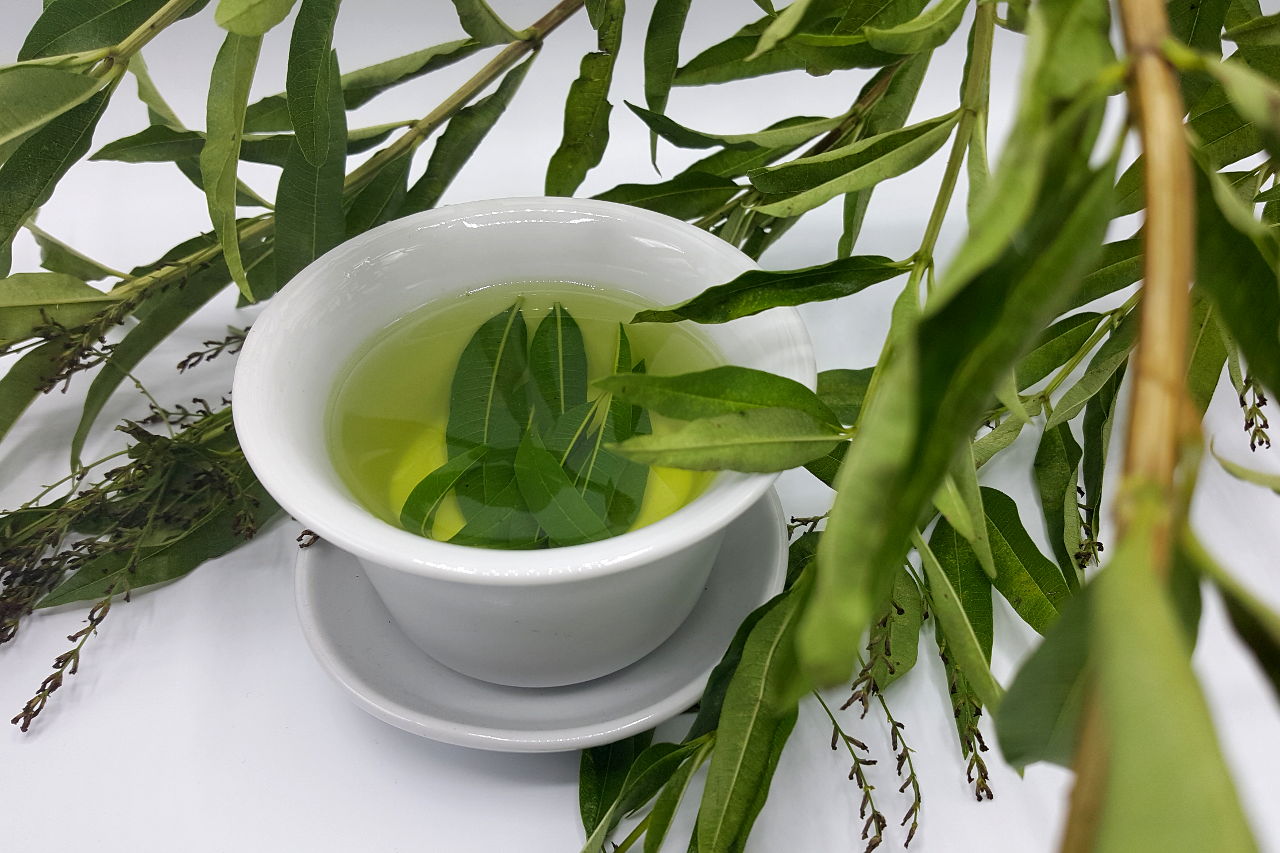
(Photos clockwise from top: courtesy of Pixabay, copyright © Evelyn Reid all rights reserved (may not be used without photographer’s explicit permission), courtesy of Pixabay).
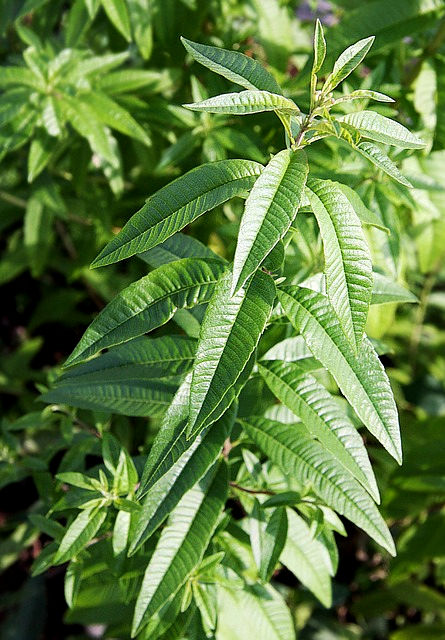
I asked her where her friend grew up.
”Syria.” Our shared elation dropped a notch. For obvious war-ravaged reasons, she didn’t know if she would ever see home again.
”Would you be willing to give her a branch of your herbs?,” her French-speaking friend sheepishly requested. How could I say no? That bushel was a humble $3. It contained enough leaves to fill my teacup every day for a season. What I gave away was but a twig worth pennies. Yet from her reaction, it was as if I gifted the Syrian lady an array of orchids or a bouquet of long-stemmed roses.
Within at most a minute of saying goodbye to the ladies to score my favorite bottle of wine, the liquor store cashier asked me what I was holding and where could he buy some. Throw in another 2-3 minutes and the Syrian dame and her friend found me back in the market browsing fresh produce. They asked me to show them where I bought the leaves. By the time we reached the public market’s resident herb farmer, I decided to buy another bushel as a man beside me asked what that heavenly smell seeping from me was.
A quick walk to the other side of the farmer’s market, and the two fresh bushels in my arms were strong enough to overpower every stench in the fish store where I periodically buy smoked trout, mackerel, and salmon gravlax. The lady behind the counter, enamored with my green purchase as if I was a walking pheromone—”what’s it called again? lemon verbena?”—insisted on clear directions to the herb farmer. Then her colleague emerged from the fish store’s pungent back room, eyes darting around the counter.
”What is that beautiful smell?”
This Ain’t No Lemon Balm
I’ve smelled lemons before. Who hasn’t? I’ve also sniffed my fair share of lemon balm and lemongrass. All lovely odors.
But I’ve never witnessed anything with a citrusy fresh scent ever elicit quite the same dramatic chain reaction that simple batch of fresh lemon verbena leaves set off at my local farmer’s market.
Native to South America, lemon verbena, aka aloysia citrodora, was brought over to Europe via the Spanish in the 17th or 18th century, eventually spreading to other parts of the world. Yet others refer to the plant by its other name, lemon beebrush. Victorian women were known to carry the herb on their person and sniff the leaves during moments of discomfort in the summer [1]. Of all the strategies to distract themselves from the horrors of the day’s fashion, it was lemon verbena that helped them forget they were wearing death traps in a heat wave.
So yes, lemon verbena has a strong lemony scent. But it’s more than that. Subtle floral and herbal undertones pair with the citrus fragrance to create an elegant, nuanced, mood lifting, and instantly recognizable aroma to those in the know.
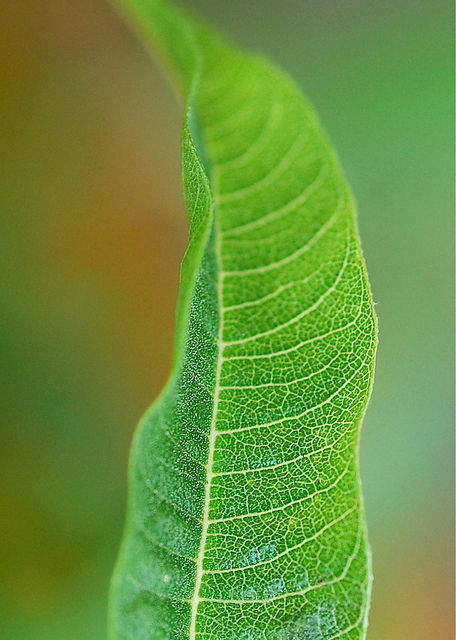
“Lemon verbena contains more catechins per gram of weight than plants praised for their health benefits, plants like rooibos, jasmine, lavender, and lemongrass.”
(Top photo © Evelyn Reid, all rights reserved. May not be used without photographer’s explicit permission. Photo bottom right courtesy of Flickr user jacqueline (CC BY-NC 2.0)).
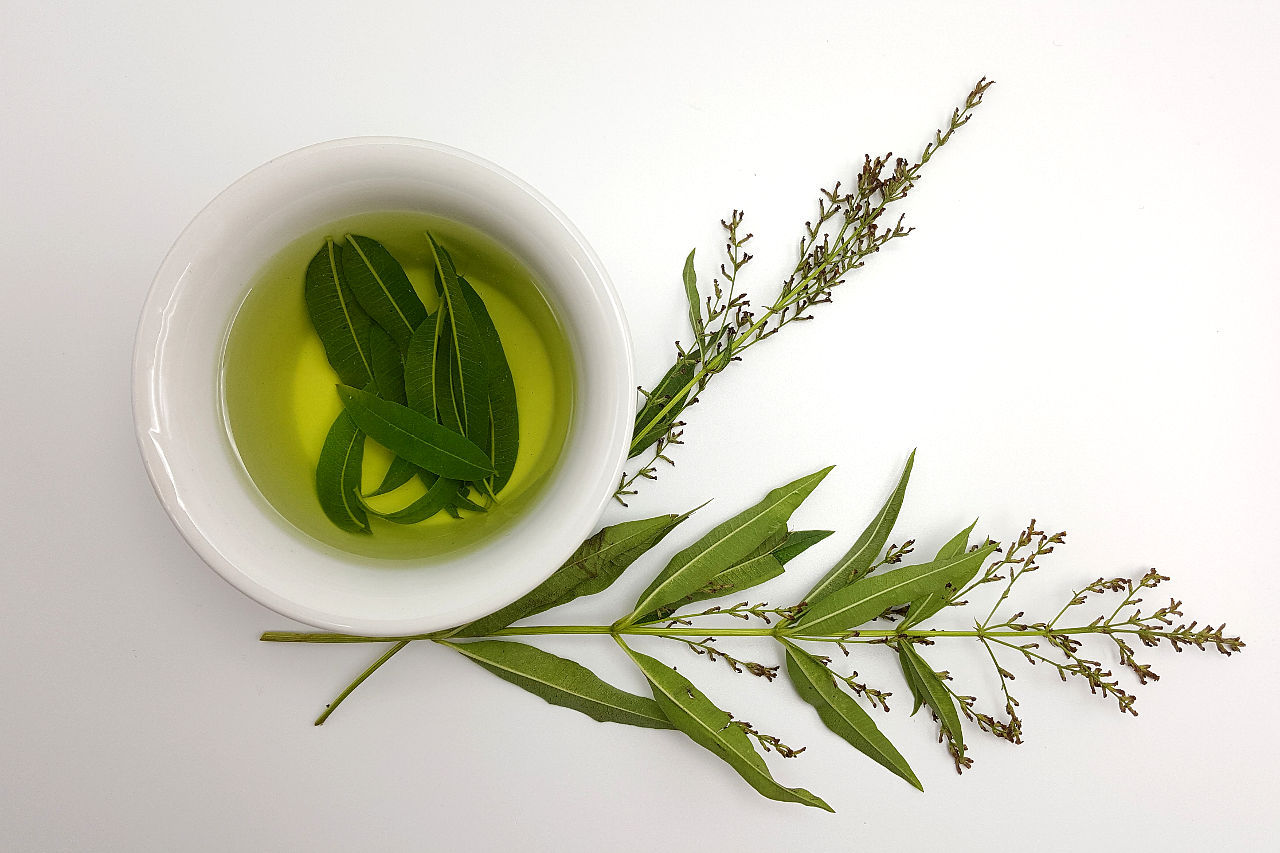
Above: lemon verbena tea. (Photo © Evelyn Reid, all rights reserved. May not be used without photographer’s explicit written permission).
Holding a cup of lemon verbena tea steeped with dried whole leaves under my nose is one of my humble life’s simplest pleasures. Leaves. Hot water. Happy. But how could that be enough to create a Pied Piper effect at the farmer’s market?
Maybe it has something to do with lemon verbena’s oddball rarity in the collective consciousness, or at least in North America—when was the last time you saw whole lemon verbena leaves sold at your local health food store?—bizarre considering how affordable and easy it is to grow an herb so uncontrollably enchanting.
For whatever reason, lemon verbena is not mainstream nor widely available in stores like it is, say, in the south of France*. Yet the few lab studies conducted on the plant point to undeniable potential as a healing agent and weight loss aid [2].
Lemon Verbena Is Full of Polyphenols
The bad news is lemon verbena hasn’t been studied enough to come to solid conclusions over its purported benefits. The good news is the studies that have bothered to examine its chemical composition concur lemon verbena’s polyphenolic composition is impressive [3,4,5,6].
Polyphenols are antioxidant-rich micronutrients the body needs to defend itself from a variety of disease-causing pathogens. Lemon verbena’s most abundant polyphenol is verbascoside, a heavily-researched antioxidant which appears to buffer against free radical damage to DNA, harm which ultimately promotes cell mutation and by extension, cancer. Reduce free radical onslaught? Lessen the risk of disease. Verbascoside has also been shown to reduce inflammation associated with heart disease, diabetes, and stroke [7].
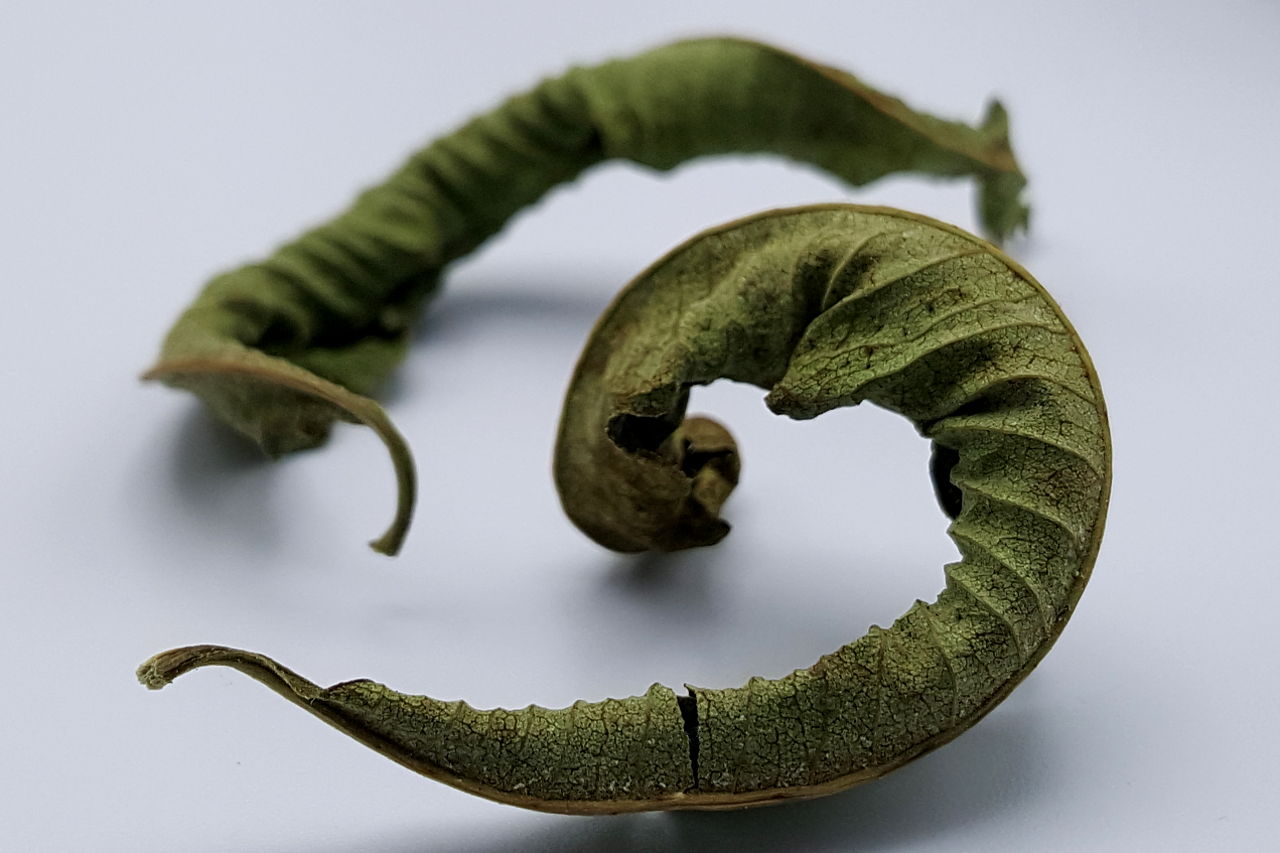
Above: lemon verbena tea leaves I dried myself. Its fragrance subdues once the leaves are dried, but reawakens when steeped in hot water. (Photo © Evelyn Reid, all rights reserved. May not be used without photographer’s explicit written permission).
Lemon Verbena’s Catechins
As for other polyphenols, a Seoul National University study compared the total catechin content of 17 different teas and herbs [6]. Lemon verbena ranked 7 out the 17, outscored only by green tea, black tea, dandelion, rose hip, chamomile, and hawthorn in total catechin content. Lemon verbena contains more catechins per gram of weight than plants praised for their health benefits, plants like rooibos, jasmine, lavender, and lemongrass.
Of interesting note, lemon verbena featured the highest amount of epigallocatechin (EGC) of all 17 plants, a catechin shown to trigger cell death in mutated breast cancer cells but not in healthy cells [11]. And a 2012 Jordanian study found that lemon verbena plant extract inhibited the growth of breast cancer cells [12]. By the way, catechins have been linked to everything from an increase in neurogenesis and alpha wave activity in the brain to weight loss. And while EGC has not yet been shown to be quite disease-fighting superstar as its catechin counterpart epigallocatechin gallate (EGCG) is, partly due to EGCG having been more rigorously studied, ECG’s positive effects on the human organism are difficult to deny.
There’s More: From Lice Control to Stomach Ulcers
Other exciting research points to lemon verbena killing head lice [13,14], stomach ulcer bacteria [15], candida albicans (a fungus that causes fatigue and weight gain) [16], and the stink bug (i.e., an annoying garden pest that sucks the life out of developing pods and fruit) [17,18]. It might even reduce joint pain when taken in conjunction with fish oil [19].
Lemon verbena might also have antibacterial [20] and mosquito-repelling properties [21] as an essential oil. There’s just one itsy problem with applying lemon verbena oil topically. It’s a skin sensitizer. Like most essential oils, it might irritate the skin, and in the case of lemon verbena, make skin more sensitive to UV light. That’s why more research is so important. It’s obvious lemon verbena oil is a treasure trove. The question is how do we safely use it? The tea isn’t a concern though, unless…
A Couple of Caveats
Apart from one 2016 Iranian study confirming lemon verbena is safe in pregnant mice [22], we’re not really sure what to say to pregnant and breastfeeding women since nobody has bothered to look into the matter.
Finally, medical professionals advise people with kidney disease steer clear of “large amounts”—whatever that means—of lemon verbena tea to avoid unnecessary irritation.
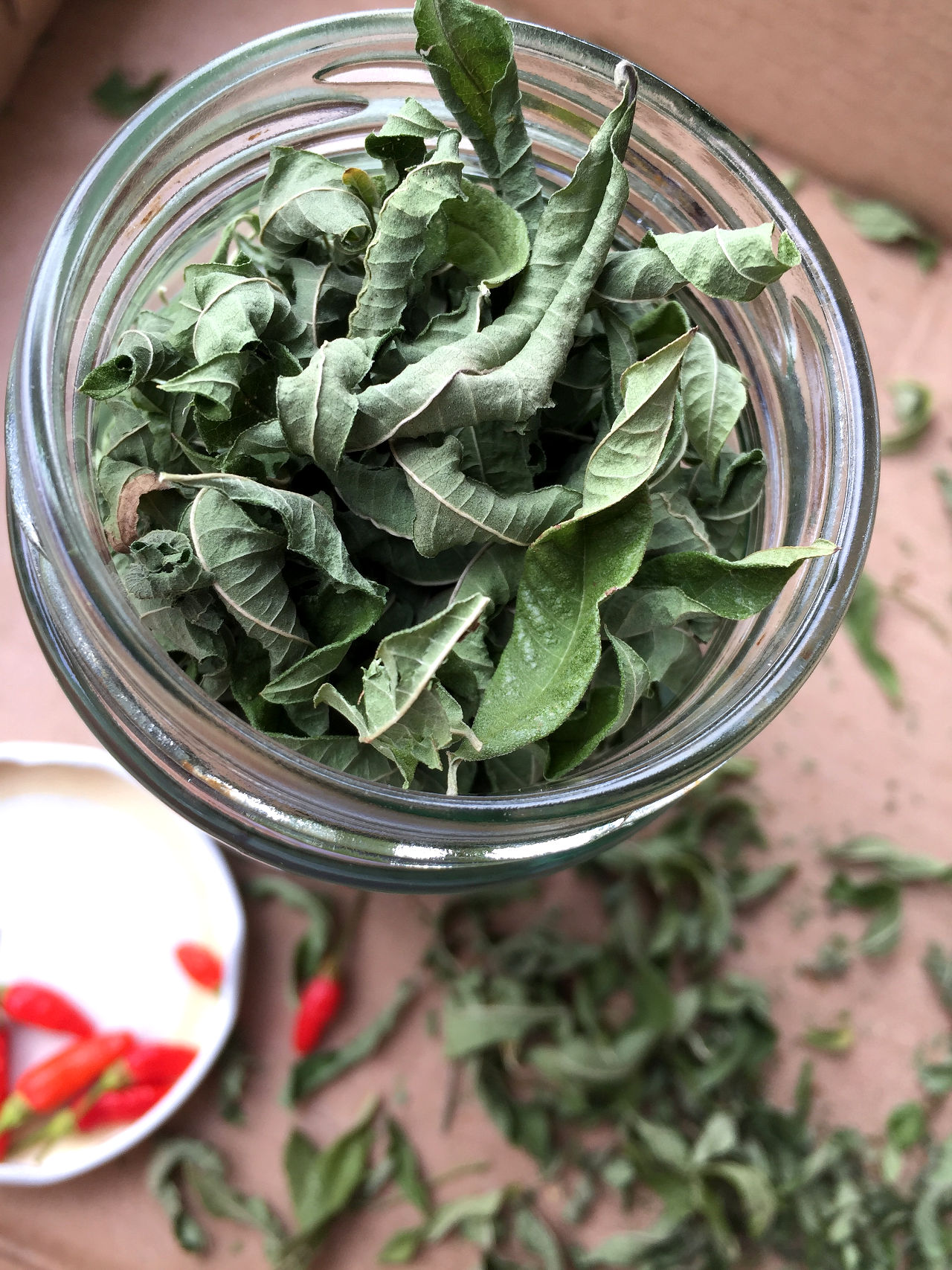
Above: dried lemon verbena leaves. (Photo by Flickr user rosa say CC BY-NC-ND 2.0).
Lemon Verbena Tea: How to Make It and Where to Find It
I throw about seven whole leaves into a huge mug full of hot water and wait a couple of minutes before drinking. I don’t even bother removing the leaves. I find them visually appealing. If you insist on chucking them, fine. It’s your cuppa. Just wait a good five minutes beforehand to give the plant’s antioxidants a chance to seep into the water.
Where to find its prized leaves? You might score some in a brick and mortar store if you look hard enough. Otherwise, buy lemon verbena online. And get a package with dried whole leaves. The aroma is stronger (i.e., heavenly) and the tea tastes better, a soothing, mood-lifting not-too-sweet-not-too-grassy herbal freshness that only lemon verbena produces.
*By the way, in French, lemon verbena is called verveine citronnelle, verveine citronnée, or verveine odorante, useful information if you happen to be frolicking in the fields of Provence.

References
-
Spurrier J. Lemon verbena: So many reasons to add aromatic plant to garden. LA Times. October 3, 2013. Online.
- Herranz-López M, Barrajón-Catalán E, Segura-Carretero A, Menéndez JA, Joven J, Micol V. Lemon verbena (Lippia citriodora) polyphenols alleviate obesity-related disturbances in hypertrophic adipocytes through AMPK-dependent mechanisms. Phytomedicine. 2015 Jun 1; 22(6): 605-14.
- Abderrahim F, Estrella S, Cristina Susin, Arribas SM, Gonzalez MC, Condezo-Hoyos L. The antioxidant activity and thermal stability of lemon verbena (aloysia triphylla) infusion. J Med Food 2011; 14 (5): 517–527.
- Bilia AR, Giomi M, Innocenti M, Gallori S. Vincieri FF. HPLC–DAD–ESI–MS analysis of the constituents of aqueous preparations of verbena and lemon verbena and evaluation of the antioxidant activity. Journal of Pharmaceutical and Biomedical Analysis 2008; 46(3): 463-470.
- Carnat A, Carnat AP, Fraisse D, Lamaison JL. The aromatic and polyphenolic composition of lemon verbena tea. Fitoterapia 1999; 70(1): 44-49.
- Yoo KM, Hwang IK, Moon B. Comparative flavonoids contents of selected herbs and associations of their radical scavenging activity with antiproliferative actions in V79-4 cells. J Food Sci. 2009; 74(6): C419-25.
- Watson RR. Preedy VR, Zibady S. Polyphenols in human health and disease. Academic Press: Cambridge. 2014. Print.
-
Zhu M, Zhu H, Tan N, Wang H, Chu H, Zhang C. Central anti-fatigue activity of verbascoside. Neurosci Lett. 2016; 616: 75-9.
- Funes L, Carrera-Quintanar L, Cerdán-Calero M, Ferrer MD, Drobnic F, Pons A, Roche E, Micol V. Effect of lemon verbena supplementation on muscular damage markers, proinflammatory cytokines release and neutrophils’ oxidative stress in chronic exercise. Eur J Appl Physiol. 2011; 111(4): 695-705.
- Carrera-Quintanar L, Funes L, Viudes E, Tur J, Micol V, Roche E, Pons A. Antioxidant effect of lemon verbena extracts in lymphocytes of university students performing aerobic training program. Scand J Med Sci Sports. 2012; 22(4): 454-61.
- Vergote D, Cren-Olivé C, Chopin V, Toillon RA, Rolando C, Hondermarck H, Le Bourhis X. (-)-Epigallocatechin (EGC) of green tea induces apoptosis of human breast cancer cells but not of their normal counterparts. Breast Cancer Res Treat. 2002; 76(3): 195-201.
-
Zihlif M1, Afifi F, Muhtaseb R, Al-Khatib S, Abaza I, Naffa R. Screening the antiangiogenic activity of medicinal plants grown and sold in Jordan. Planta Med. 2012; 78(3): 297-301.
-
Gutiérrez MM, Werdin-González JO, Stefanazzi N, Bras C, Ferrero AA. The potential application of plant essential oils to control pediculus humanus capitis (anoplura: pediculidae). Parasitol Res. 2016; 115(2): 633-41.
-
Toloza AC, Zygadlo J, Biurrun F, Rotman A, Picollo MI. Bioactivity of Argentinean essential oils against permethrin-resistant head lice, pediculus humanus capitis. J Insect Sci. 2010; 10: 185.
- Ohno T, Kita M, Yamaoka Y, Imamura S, Yamamoto T, Mitsufuji S, Kodama T, Kashima K, Imanishi J. Antimicrobial activity of essential oils against Helicobacter pylori. Helicobacter. 2003 Jun;8(3):207-15.
- Ghasempour M, Omran SM, Moghadamnia AA, Shafiee F. Effect of aqueous and ethanolic extracts of Lippia citriodora on candida albicans. Electron Physician. 2016; 8(8): 2752-2758.
- Werdin González JO, Laumann RA, da Silveira S, Moraes MC, Borges M, Ferrero AA. Lethal and sublethal effects of four essential oils on the egg parasitoids Trissolcus basalis. Chemosphere. 2013; 92(5): 608-15.
- Werdin González JO, Gutiérrez MM, Murray AP, Ferrero AA. Biological activity of essential oils from aloysia polystachya and aloysia citriodora (verbenaceae) against the soybean pest nezara viridula (hemiptera: pentatomidae). Nat Prod Commun. 2010 Feb;5(2):301-6.
- Caturla N, Funes L, Pérez-Fons L, Micol V. A randomized, double-blinded, placebo-controlled study of the effect of a combination of lemon verbena extract and fish oil omega-3 fatty acid on joint management. Journal of Alternative and Complementary Medicine. 2011;17(11):1051-1063.
- Oukerrou MA, Tilaoui M, Mouse HA, Leouifoudi I, Jaafari A, Zyad A. Chemical composition and cytotoxic and antibacterial activities of the essential oil of aloysia citriodora palau grown in Morocco. Adv Pharmacol Sci. 2017; 2017: 7801924.
- Gillij YG, Gleiser RM, Zygadlo JA. Mosquito repellent activity of essential oils of aromatic plants growing in Argentina. Bioresour Technol. 2008; 99(7): 2507-15.
- Etemad L, Zafari R, Moallem SA, Vahdati-Mashhadian N, Shirvan ZS, Hosseinzadehe H. Teratogenic effect of verbascoside, main constituent of lippia citriodora leaves, in mice. Iran J Pharm Res. 2016; 15(2): 521–525.
Lemon Verbena Tea: The Forgotten Wonder Leaves

by Evelyn Reid
Originally published on Where’s Your Head?
December 7, 2017

The first time I found fresh lemon verbena leaves at my local farmer’s market, I was accosted by no less than six complete strangers within ten minutes of buying the herb.
The brouhaha started within seconds of purchasing a bushel of the fragrant leaves the herb farmer had hidden behind his stand. ”Do you like tea?,” he asked me. ”I have something you’re going to love. I grew it myself,” he said, seducing me with lemon verbena’s permeating scent, its olfactory intensity amplified with every brush its leaves made against my skin. It smelled of something lemony. But different. Barely 20 steps later on my way to the liquor store to pick up my favorite bottle of Sangiovese, two older women approached me. One could only speak Arabic. The other was fluent in French, my second language.
”My friend says you smell like her childhood,” said the French speaker. ”The leaves you’re carrying grow in her native land.”
Her golden-aged friend lunged toward me with the energy of a toddler to smell the bushel cradled in the nook of my arm. She was beaming, as if the scent was adding years to her life.

Above: lemon verbena flowers look purple as buds, with white petals unfolding with a yellow center when they bloom. (Photo courtesy of Pixabay).
I asked her where her friend grew up.
”Syria.” Our shared elation dropped a notch. For obvious war-ravaged reasons, she didn’t know if she would ever see home again.
”Would you be willing to give her a branch of your herbs?,” her French-speaking friend sheepishly requested. How could I say no? That bushel was a humble $3. It contained enough leaves to fill my teacup every day for a season. What I gave away was but a twig worth pennies. Yet from her reaction, it was as if I gifted the Syrian lady an array of orchids or a bouquet of long-stemmed roses.
Within at most a minute of saying goodbye to the ladies to score my favorite bottle of wine, the liquor store cashier asked me what I was holding and where could he buy some. Throw in another 2-3 minutes and the Syrian damre and her friend found me back in the market browsing fresh produce. They asked me to show them where I bought the leaves. By the time we reached the public market’s resident herb farmer, I decided to buy another bushel as a man beside me asked what that heavenly smell seeping from me was.
A quick walk to the other side of the farmer’s market, and the two fresh bushels in my arms were strong enough to overpower every stench in the fish store where I periodically buy smoked trout, mackerel, and salmon gravlax. The lady behind the counter, enamored with my green purchase as if I was a walking pheromone—”what’s it called again? lemon verbena?”—insisted on clear directions to the herb farmer. Then her colleague emerged from the fish store’s pungent back room, eyes darting around the counter.
”What is that beautiful smell?”

Above: fresh lemon verbena tea. (Photo © Evelyn Reid, all rights reserved. May not be used without photographer’s explicit written permission).
This Ain’t No Lemon Balm
I’ve smelled lemons before. Who hasn’t? I’ve also sniffed my fair share of lemon balm and lemongrass. All lovely odors.
But I’ve never witnessed anything with a citrusy fresh scent ever elicit quite the same dramatic chain reaction that simple batch of fresh lemon verbena leaves set off at my local farmer’s market.
Native to South America, lemon verbena, aka aloysia citrodora, was brought over to Europe via the Spanish in the 17th or 18th century, eventually spreading to other parts of the world. Yet others refer to the plant by its other name, lemon beebrush. Victorian women were known to carry the herb on their person and sniff the leaves during moments of discomfort in the summer [1]. Of all the strategies to distract themselves from the horrors of the day’s fashion, it was lemon verbena that helped them forget they were wearing death traps in a heat wave.
So yes, lemon verbena has a strong lemony scent. But it’s more than that. Subtle floral and herbal undertones pair with the citrus fragrance to create an elegant, nuanced, mood lifting, and instantly recognizable aroma to those in the know.
Holding a cup of lemon verbena tea steeped with dried whole leaves under my nose is one of my humble life’s simplest pleasures. Leaves. Hot water. Happy. But how could that be enough to create a Pied Piper effect at the farmer’s market?
Maybe it has something to do with lemon verbena’s oddball rarity in the collective consciousness, or at least in North America—when was the last time you saw whole lemon verbena leaves sold at your local health food store?—bizarre considering how affordable and easy it is to grow an herb so uncontrollably enchanting.
For whatever reason, lemon verbena is not mainstream nor widely available in stores like it is, say, in the south of France*. Yet the few lab studies conducted on the plant point to undeniable potential as a healing agent and weight loss aid [2].
Lemon Verbena Is Full of Polyphenols
The bad news is lemon verbena hasn’t been studied enough to come to solid conclusions over its purported benefits. The good news is the studies that have bothered to examine its chemical composition concur lemon verbena’s polyphenolic composition is impressive [3,4,5,6].
Polyphenols are antioxidant-rich micronutrients the body needs to defend itself from a variety of disease-causing pathogens. Lemon verbena’s most abundant polyphenol is verbascoside, a heavily-researched antioxidant which appears to buffer against free radical damage to DNA, harm which ultimately promotes cell mutation and by extension, cancer. Reduce free radical onslaught? Lessen the risk of disease. Verbascoside has also been shown to reduce inflammation associated with heart disease, diabetes, and stroke [7].
“Lemon verbena contains more catechins per gram of weight than plants praised for their health benefits, plants like rooibos, jasmine, lavender, and lemongrass.”

Above: lemon verbena leaf close up. Rubbing the leaf releases its unique fragrance. (Photo by Flickr user jacqueline (CC BY-NC 2.0)).
Lemon Verbena’s Catechins
As for other polyphenols, a Seoul National University study compared the total catechin content of 17 different teas and herbs [6]. Lemon verbena ranked 7 out the 17, outscored only by green tea, black tea, dandelion, rose hip, chamomile, and hawthorn in total catechin content. Lemon verbena contains more catechins per gram of weight than plants praised for their health benefits, plants like rooibos, jasmine, lavender, and lemongrass.
Of interesting note, lemon verbena featured the highest amount of epigallocatechin (EGC) of all 17 plants, a catechin shown to trigger cell death in mutated breast cancer cells but not in healthy cells [11]. And a 2012 Jordanian study found that lemon verbena plant extract inhibited the growth of breast cancer cells [12]. By the way, catechins have been linked to everything from an increase in neurogenesis and alpha wave activity in the brain to weight loss. And while EGC has not yet been shown to be quite disease-fighting superstar as its catechin counterpart epigallocatechin gallate (EGCG) is, partly due to EGCG having been more rigorously studied, ECG’s positive effects on the human organism are difficult to deny.
There’s More: From Lice Control to Stomach Ulcers
Other exciting research points to lemon verbena killing head lice [13,14], stomach ulcer bacteria [15], candida albicans (a fungus that causes fatigue and weight gain) [16], and the stink bug (i.e., an annoying garden pest that sucks the life out of developing pods and fruit) [17,18]. It might even reduce joint pain when taken in conjunction with fish oil [19].
Lemon verbena might also have antibacterial [20] and mosquito-repelling properties [21] as an essential oil. There’s just one itsy problem with applying lemon verbena oil topically. It’s a skin sensitizer. Like most essential oils, it might irritate the skin, and in the case of lemon verbena, make skin more sensitive to UV light. That’s why more research is so important. It’s obvious lemon verbena oil is a treasure trove. The question is how do we safely use it? The tea isn’t a concern though, unless…
A Couple of Caveats
Apart from one 2016 Iranian study confirming lemon verbena is safe in pregnant mice [22], we’re not really sure what to say to pregnant and breastfeeding women since nobody has bothered to look into the matter.
Finally, medical professionals advise people with kidney disease steer clear of “large amounts”— whatever that means—of lemon verbena tea to avoid unnecessary irritation.

Above: dried lemon verbena leaves. (Photo by Flickr user rosa say CC BY-NC-ND 2.0).
Lemon Verbena Tea: How to Make It and Where to Find It
I throw about seven whole leaves into a huge mug full of hot water and wait a couple of minutes before drinking. I don’t even bother removing the leaves. I find them visually appealing. If you insist on chucking them, fine. It’s your cuppa. Just wait a good five minutes beforehand to give the plant’s antioxidants a chance to seep into the water.
Where to find its prized leaves? You might score some in a brick and mortar store if you look hard enough. Otherwise, buy lemon verbena online. And get a package with dried whole leaves. The aroma is stronger (i.e., heavenly) and the tea tastes better, a soothing, mood-lifting not-too-sweet-not-too-grassy herbal freshness that only lemon verbena produces.
*By the way, in French, lemon verbena is called verveine citronnelle, verveine citronnée, or verveine odorante, useful information if you happen to be frolicking in the fields of Provence.

References
-
Spurrier J. Lemon verbena: So many reasons to add aromatic plant to garden. LA Times. October 3, 2013. Online.
- Herranz-López M, Barrajón-Catalán E, Segura-Carretero A, Menéndez JA, Joven J, Micol V. Lemon verbena (Lippia citriodora) polyphenols alleviate obesity-related disturbances in hypertrophic adipocytes through AMPK-dependent mechanisms. Phytomedicine. 2015 Jun 1; 22(6): 605-14.
- Abderrahim F, Estrella S, Cristina Susin, Arribas SM, Gonzalez MC, Condezo-Hoyos L. The antioxidant activity and thermal stability of lemon verbena (aloysia triphylla) infusion. J Med Food 2011; 14 (5): 517–527.
- Bilia AR, Giomi M, Innocenti M, Gallori S. Vincieri FF. HPLC–DAD–ESI–MS analysis of the constituents of aqueous preparations of verbena and lemon verbena and evaluation of the antioxidant activity. Journal of Pharmaceutical and Biomedical Analysis 2008; 46(3): 463-470.
- Carnat A, Carnat AP, Fraisse D, Lamaison JL. The aromatic and polyphenolic composition of lemon verbena tea. Fitoterapia 1999; 70(1): 44-49.
- Yoo KM, Hwang IK, Moon B. Comparative flavonoids contents of selected herbs and associations of their radical scavenging activity with antiproliferative actions in V79-4 cells. J Food Sci. 2009; 74(6): C419-25.
- Watson RR. Preedy VR, Zibady S. Polyphenols in human health and disease. Academic Press: Cambridge. 2014. Print.
-
Zhu M, Zhu H, Tan N, Wang H, Chu H, Zhang C. Central anti-fatigue activity of verbascoside. Neurosci Lett. 2016; 616: 75-9.
- Funes L, Carrera-Quintanar L, Cerdán-Calero M, Ferrer MD, Drobnic F, Pons A, Roche E, Micol V. Effect of lemon verbena supplementation on muscular damage markers, proinflammatory cytokines release and neutrophils’ oxidative stress in chronic exercise. Eur J Appl Physiol. 2011; 111(4): 695-705.
- Carrera-Quintanar L, Funes L, Viudes E, Tur J, Micol V, Roche E, Pons A. Antioxidant effect of lemon verbena extracts in lymphocytes of university students performing aerobic training program. Scand J Med Sci Sports. 2012; 22(4): 454-61.
- Vergote D, Cren-Olivé C, Chopin V, Toillon RA, Rolando C, Hondermarck H, Le Bourhis X. (-)-Epigallocatechin (EGC) of green tea induces apoptosis of human breast cancer cells but not of their normal counterparts. Breast Cancer Res Treat. 2002; 76(3): 195-201.
-
Zihlif M1, Afifi F, Muhtaseb R, Al-Khatib S, Abaza I, Naffa R. Screening the antiangiogenic activity of medicinal plants grown and sold in Jordan. Planta Med. 2012; 78(3): 297-301.
-
Gutiérrez MM, Werdin-González JO, Stefanazzi N, Bras C, Ferrero AA. The potential application of plant essential oils to control pediculus humanus capitis (anoplura: pediculidae). Parasitol Res. 2016; 115(2): 633-41.
-
Toloza AC, Zygadlo J, Biurrun F, Rotman A, Picollo MI. Bioactivity of Argentinean essential oils against permethrin-resistant head lice, pediculus humanus capitis. J Insect Sci. 2010; 10: 185.
- Ohno T, Kita M, Yamaoka Y, Imamura S, Yamamoto T, Mitsufuji S, Kodama T, Kashima K, Imanishi J. Antimicrobial activity of essential oils against Helicobacter pylori. Helicobacter. 2003 Jun;8(3):207-15.
- Ghasempour M, Omran SM, Moghadamnia AA, Shafiee F. Effect of aqueous and ethanolic extracts of Lippia citriodora on candida albicans. Electron Physician. 2016; 8(8): 2752-2758.
- Werdin González JO, Laumann RA, da Silveira S, Moraes MC, Borges M, Ferrero AA. Lethal and sublethal effects of four essential oils on the egg parasitoids Trissolcus basalis. Chemosphere. 2013; 92(5): 608-15.
- Werdin González JO, Gutiérrez MM, Murray AP, Ferrero AA. Biological activity of essential oils from aloysia polystachya and aloysia citriodora (verbenaceae) against the soybean pest nezara viridula (hemiptera: pentatomidae). Nat Prod Commun. 2010 Feb;5(2):301-6.
- Caturla N, Funes L, Pérez-Fons L, Micol V. A randomized, double-blinded, placebo-controlled study of the effect of a combination of lemon verbena extract and fish oil omega-3 fatty acid on joint management. Journal of Alternative and Complementary Medicine. 2011;17(11):1051-1063.
- Oukerrou MA, Tilaoui M, Mouse HA, Leouifoudi I, Jaafari A, Zyad A. Chemical composition and cytotoxic and antibacterial activities of the essential oil of aloysia citriodora palau grown in Morocco. Adv Pharmacol Sci. 2017; 2017: 7801924.
- Gillij YG, Gleiser RM, Zygadlo JA. Mosquito repellent activity of essential oils of aromatic plants growing in Argentina. Bioresour Technol. 2008; 99(7): 2507-15.
- Etemad L, Zafari R, Moallem SA, Vahdati-Mashhadian N, Shirvan ZS, Hosseinzadehe H. Teratogenic effect of verbascoside, main constituent of lippia citriodora leaves, in mice. Iran J Pharm Res. 2016; 15(2): 521–525.
